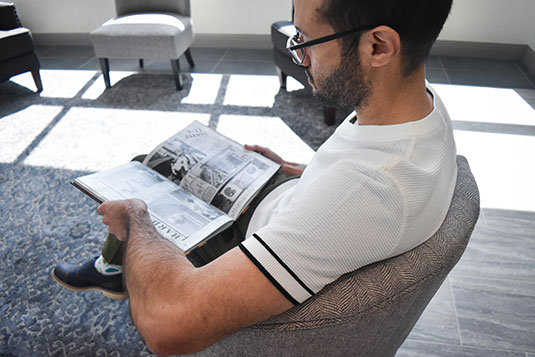In the eighth of our 8-part series, we conclude our historic series with interviews of two MBU community members who have very specific ties to our nation’s military. Pam Hiebert, associate director of student financial services, and Jose Silva, adjunct music instructor, reflect on Sept. 11, 2001, remembering the 20-year anniversary of the infamous day.
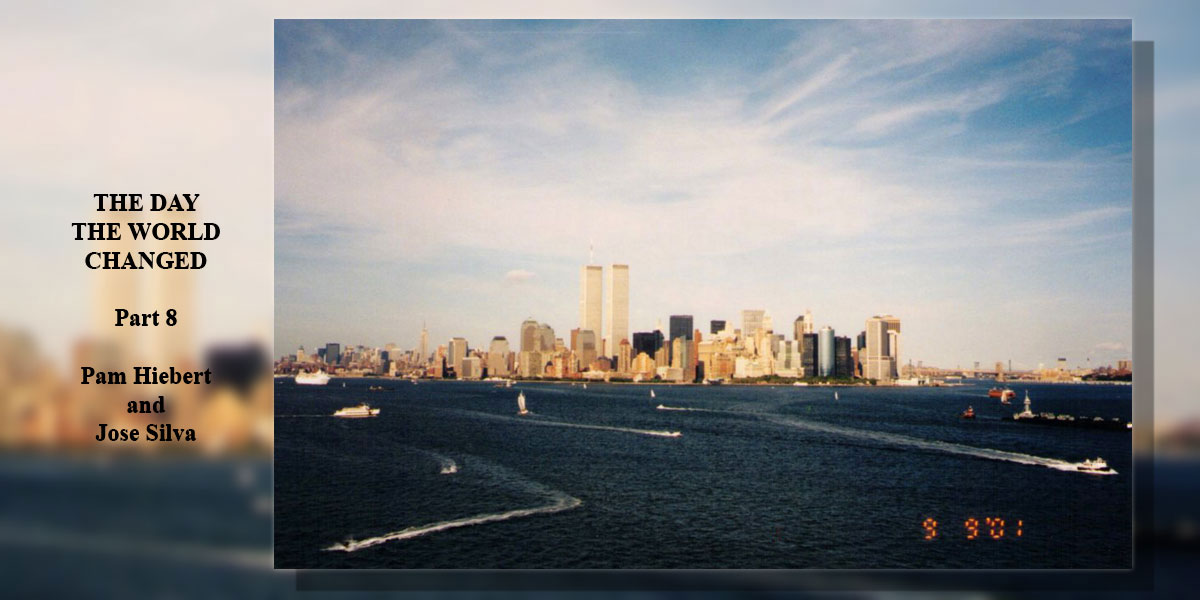 The North Tower and South Tower of the World Trade Center in New York City collapsed during the terrorist attacks on Sept. 11, 2001. This photo was captured by MBU’s Heather Goodin just two days before America was changed forever. Notice the date stamp in the bottom right corner as this photo was shot with film. Photo by Heather Goodin
The North Tower and South Tower of the World Trade Center in New York City collapsed during the terrorist attacks on Sept. 11, 2001. This photo was captured by MBU’s Heather Goodin just two days before America was changed forever. Notice the date stamp in the bottom right corner as this photo was shot with film. Photo by Heather Goodin
— Part 8 of an 8-Part Series —
September 11, 2001 (all times Eastern Daylight Time)
8:46 a.m. – An airliner strikes the North Tower of the World Trade Center
9:03 a.m. – An airliner strikes the South Tower of the World Trade Center
9:37 a.m. – An airliner strikes the Pentagon in Washington, D.C.
9:59 a.m. – The South Tower collapses
10:07 a.m. – Flight 93 crashes in Shanksville, Pennsylvania
10:28 a.m. – The North Tower collapses
September 11, 2001, has a special place in the heart of every American. Many students at MBU were very young or not even born yet at the time of this infamous day. We can only learn about what happened during the terrorist attacks by hearing the stories of those who remember this time filled with fear, pain or even hope. MBU Timeline photojournalists asked our staff and faculty what they remember about Sept. 11, 2001, on its 20-year anniversary.
__________________________________________________
Pam Hiebert
“And as we progressed through the morning, we listened to a Christian talk show where they were actually fun and jokey. “So then, of course, we turned on the television and I immediately sent the children out of the house because I didn’t want them to see that it was so horrific.” “So, I did a lot of crying and praying, and there was that moment, especially when that second plane hit and then the plane hit the Pentagon. There was just this strange feeling that maybe this was the end of the world.” “We didn’t know what was gonna happen. Were there going to be dozens of planes and could they be hitting everywhere? So it was terrifying, and more than anything, I was thinking what does this mean for my kids and their safety and our future?” “Specifically for me, three of my children were boys. My three boys all went into the military and all of them have had deployments to the Middle East. So they’ve been actually involved in the war on terror, so it’s affected their lives dramatically in ways that I don’t even know. And I don’t even know to what extent that affected their decision to fight for their country, defend their country, but I do know that they sacrificed a great deal of their lives in defense of freedom. So honoring them for what they’ve done, and looking back and seeing that perhaps maybe that event changed the trajectory for their life and their decision for how they went forward.” –Interview by Orville Parker III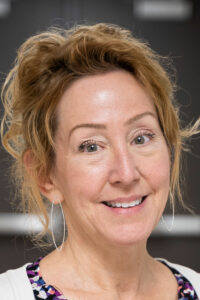 So at first we assumed it was just some strange joke when they said something.”
So at first we assumed it was just some strange joke when they said something.”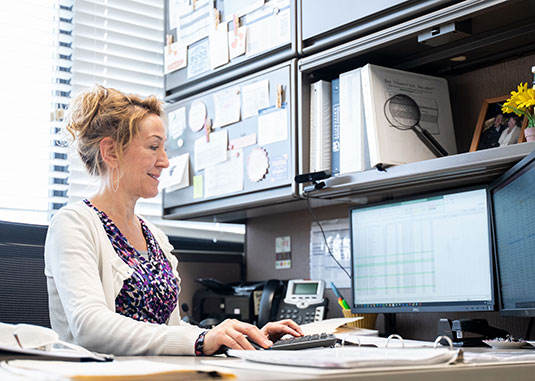
__________________________________________________
Jose Silva
“So as we were watching, live on TV, we saw the second plane crash into the second tower and that’s when I thought to myself, ‘What is going on?’ I didn’t know what to think. I wasn’t afraid, but I also was just not very comfortable … the entire day that day was people talking about what was going on.” “Nobody can make sense of what’s going on and then there’s panic because I was a military child. My dad was in the Army at the time, so I was living in an Army base; 50 percent of the people that were going to that high school also lived in that military base, Fort Leonard Wood. So there was talk of Fort Leonard Wood being high risk.” “Lunch happened and that’s when talk was going on about what the military installation was going to do and how that was going to affect people that live there such as myself … the fact that it was on extremely high alert, it was on the highest alert … there was risk that we could even be bombed because of the mission that Fort Leonard Wood carried out, which was military police, but also chemical biological nuclear warfare education, and my dad was one of the instructors.” “That’s when it got really personal for me, that my own home could be potentially at high risk for terrorism. Last hour there was an official notice that we would have an early release because all military children had to go home. The base … was going to be on lockdown. At 9 o’clock they placed a curfew on all residents at the installation, nobody could get out and if they did they would get arrested.” “Ever since then, security measures have always been different. Fort Leonard Wood, and for all intents and purposes most military bases, you could just drive right in, there was no ID card check.” “A lot of people use that as a shortcut to get from one part of that area to the other instead of driving around, which could be an easy 30-mile hike, but for now it was ID check for anybody that lived there or extremely essential personnel.” “The lines to get in the next day, on Sept. 12, spanned for miles just to get in. People would wait hours just to get in the base and I remember my mom picking us up from school early just so we didn’t have to worry about facing that. It was a scary moment.” “Also personally, granted I am much more mature now than I was 20 years ago, but racial profiling became a huge thing after September 11 and … I was racially profiled. People thought I was of Middle Eastern descent for whatever reason. I was much more tan then, I used to be a lifeguard, so I was extremely tan. I am Puerto Rican, but for most people in that area of Missouri, most people have never stepped outside of their city. So to see something like that and to maybe see what a Middle Easterner looks like for the first time, they see I’m very tan, I have a nose that’s maybe bigger than a Caucasian nose and all of a sudden I’m getting profiled as a Middle Easterner and that was extremely offensive to me.” “If I could tell my 16-year-old self what I know now, I would say you have to forgive people for not knowing what they don’t know. It wasn’t them being racist, it’s just now this is what life is. … I remember someone in my government class saying, ‘Are you one of those terrorists?’ That was just the reality of it. There are certain things that we would never go back to the world the way it was before then, but I would say that profiling had become huge, is always going to be huge and I don’t think that’s ever going to go away now.” –Interview by McKenzie Sheehy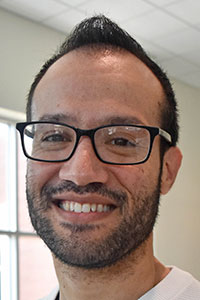 “There’s talks of children of government officials who were working near or at the World Trade Center not being able to get in contact with their loved ones, with their parents. I had some friends that said they had parents that were over there and they had no idea if they were doing OK or not.”
“There’s talks of children of government officials who were working near or at the World Trade Center not being able to get in contact with their loved ones, with their parents. I had some friends that said they had parents that were over there and they had no idea if they were doing OK or not.”